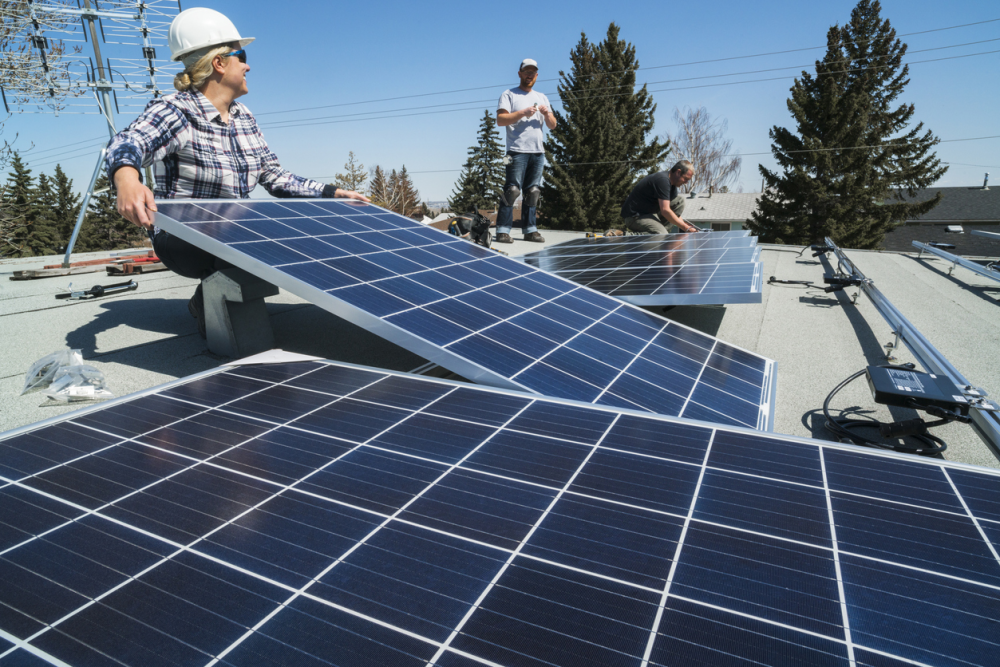The passage of the Sustainable Jobs Act through the House of Commons is good news for Canadian workers and the environment. We’re pleased to see it in the Senate. The Pembina Institute is one of many environmental and labour groups that has advocated for such legislation to ensure that workers are empowered to help lead in the pathway to a clean economy.
Global investments in the energy transition soared to $1.8 trillion in 2023, a 17 per cent jump from the year before, according to a recent Bloomberg report. Sales of zero-emission vehicles went from 3% in 2020 to 12% in 2023, with Quebec and BC seeing 21% of sales being ZEVs. The number of residential heat pumps installed in Canada doubled over the last two decades to a total of over 800,000 units, as people noted the reliability of these technologies, even in Canadian winters. The bottom line: the energy transition is at a tipping point.
Canada should aspire to be a leader in this transition, and the Sustainable Jobs Act would position workers to benefit significantly from investments in all aspects of the clean energy sector. The Act provides a foundation for governments, workers, labour, industry, Indigenous peoples and experts to come together to share their ideas about decisions and investments that seize opportunities to create economic growth and high-quality jobs for Canadians in an evolving energy future.
The legislation puts in place the Partnership Council and Secretariat as clear mechanisms for ongoing social dialogue and engagement directly with communities and workers, as well as broader government and inter-jurisdictional coordination. Reporting requirements hold government to account and ensure continued and renewed momentum on sustainable jobs planning at regular intervals as we move closer to 2050. Guiding principles set out in the Act connect the need for sustainable jobs to be defined and grounded in labour rights to ensure Canada’s net-zero economy is built on high-quality jobs.
Action by the Senate will move all of us to the next phase of work: implementation. The Pembina Institute has worked with the Canadian Labour Congress to explore how Canada can plan for an energy transition that works for the benefit of workers—giving them a seat at the table in key conversations that impact their lives. The result of this collaboration is the Sustainable Jobs Blueprint, Part Iand Part II.
It’s time to:
- Invest in skills and training capacity to give workers the tools to succeed
- Provide income security and programs that enableworkers to choose to find new jobs or retire early
- Enable a framework to uphold good job standards in the clean economy
- Engage with workers about their futures
- Invest in regions to build resilience in a net-zero economy
- Develop a net-zero industrial policy that creates conditions for thriving industries
- Leverage private capital to support sustainable jobs
Canada has many of the vital resources needed to succeed in the clean economy of the future. With the passage of the Sustainable Jobs Act, we will be a step closer to getting there. We ask that the Senate work quickly to pass this Act into law.
Support for the Sustainable Jobs Act
We add Pembina Institute’s voice to organizations that have been advocating for swift passage of this bill, including the Canadian Labour Congress, Unifor, Steelworkers, IBEW, Union of Operating Engineers, Environmental Defence, IISD,Équiterre, CAN-Rac, Ecojustice and Blue Green Canada.
The Pembina Institute is a member of Blue Green Canada, along with other ENGOs, Unifor, and United Steelworkers. Blue Green Canada brings together workers and environmental organizations (ENGOs) to prioritize preserving jobs, reducing carbon emissions, and building a sustainable future. All members spoke in support of the passing of the Sustainable Jobs Act this week.






